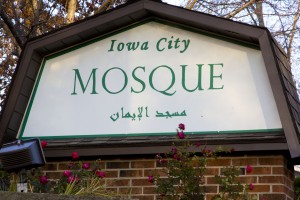At Home in the US Heartland: Two Muslim Families in Iowa
February 03, 2004
Cedar Rapids, Iowa
It’s one of the oldest Muslim communities in the United States, and it’s right in the middle of the midwestern heartland: Cedar Rapids, Iowa. It’s a state that is overwhelmingly Christian – yet recent immigrants as well as Muslims who were born here say they’ve found it a comfortable place to make their homes and practice their religion.
Zeineb Mehdi, for example, grew up in Tunisia, and moved to Cedar Rapds 23 years ago. A devout Muslim, she serves on the board of the local Islamic Center, and attends prayers in the mosque there.
But it’s her peace activism that has made Zeineb Mehdi well known in this small city – and why she was named Cedar Rapids Woman of the Year in 2003.
She’s the president of Women for Peace Iowa, which pickets for peace every Friday in downtown Cedar Rapids. “My religion teaches me that you have to be socially conscious of the needs of people,” she says. “You have to help others. You have to seek peace.”
Zeineb Mehdi came to Cedar Rapids as a college student, not intending to stay after she completed her education. But she married another Tunisian, and gave birth to a son, now 17. In her first years in Cedar Rapids, Mehdi says, she was surprised to find that Iowans knew nothing about her native country. “The biggest challenge wasn’t that I was a Muslim,” Mehdi recalls, “but that I was from Tunisia. People had no idea where Tunisia was! I couldn’t understand how people didn’t know geography. Well, later on, when I found out that [non-Iowans] don’t know where Iowa is — they think it’s Idaho or Ohio — then I was more sympathetic!”
Mehdi helped found Women for Peace Iowa after the 9/11 attacks. She says it began when a group of four Christian women invited four Muslim women to meet with them. “They wanted to voice their concern about the wellbeing of Muslims in Cedar Rapids, from woman to woman, to ask if there was anything these ladies could do help our community, the Muslim ladies, whether it’s helping them go to the store, pick up our children from school, even stand vigil at our Friday prayers. They were very eager to let us know that we are part of this community, that whatever happened that day, even though it was labeled a Muslim terrorist act, it had nothing to do with the Muslim community of Cedar Rapids.”
Mehdi’s teenage son, Samy Kobrosly, also takes part in civic life – last summer, he was elected president of Junior Optimists, an international youth organization with 17,000 members. Born and raised in Cedar Rapids, Samy says it’s silly to ask him what it’s like growing up Muslim in Iowa.
“It doesn’t make any sense to me when people ask, ‘how does it feel?” he says. “I play basketball, I do show choir, I do the plays, I do everything everybody else does. My parents are very liberal on the whole. A lot of people who come from foreign countries are very ‘keep it in the bubble.’ My parents kind of let me out in the world, like ‘hey, he’s an American, let’s let him go.’ So, I kind of was blessed with being able to go out at night and see my friends, and go to movies and try everything once.”
Not surprisingly, young people who have grown up in Cedar Rapids’ small Muslim community may end up marrying non-Muslims. Jalel Aossey, 29, met his wife Alisa in college. She was raised a Christian Mennonite and does not plan to convert to Islam. But Jalel says his Muslim faith has become increasingly strong since he married. “As we’ve kind of evolved together, it’s become more and more important,” he says. “And so part of the discussions we have now revolve around how do you raise a family, what constitutes the daily activities in your life? And I will say, if you look at the majority of differences we do have, they kind of fall by the wayside. It’s the things that are similar between the two faiths that you really grasp onto.”
Jalel is also a modern American husband, who’s proud of his wife’s career as a firefighter. Alisa recalls how he allayed her fears in her first week on the job. “I came home and I was kind of upset, and I remember I told him, ‘I can’t do this, I just want to go back to Agon, where I worked before, I just want to go back and have everything be the way it was before.’ And he said, ‘you know what? You can do this.’ So he was supportive from Day One.”
Growing up in Iowa, Jalel Aossey attended public schools and was a Boy Scout – one of the inspirations for the Muslim youth camp he’s helping to found outside Cedar Rapids. He says despite cultural differences, he has never faced discrimination in his home state. “In Iowa, I never had any troubles at all being accepted as a Muslim,” he said. “I think there was more curiosity than anything else.”
Zeineb Mehdi says that was also her experience – and why she chose to settle here, far from her native land. “I was very well-accepted, I was embraced — people made me feel at home,” she said. “I mean, I came here for a year, and 23 years later, I’m still here. This is home now for me. I’m very proud to be part of this community.”


















